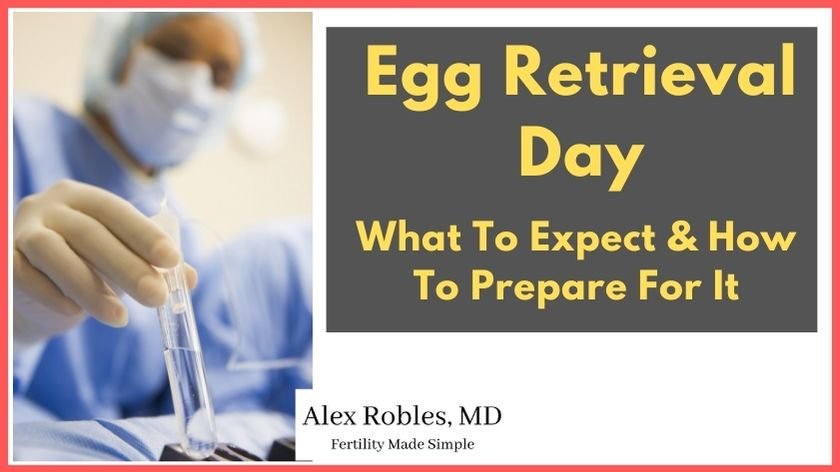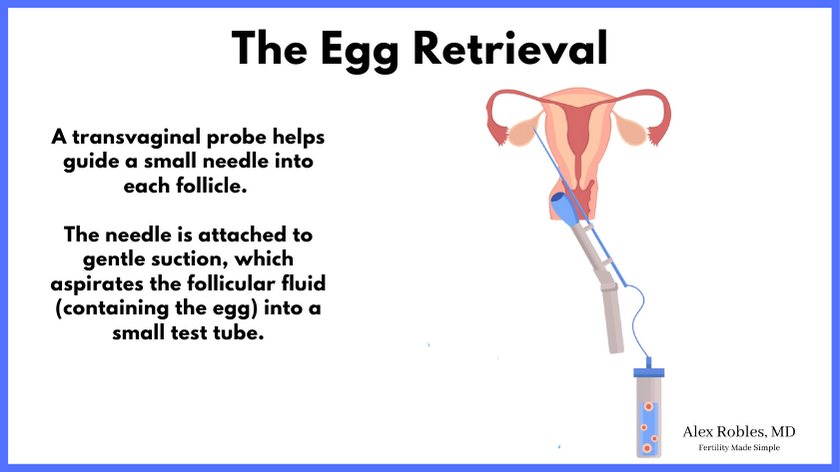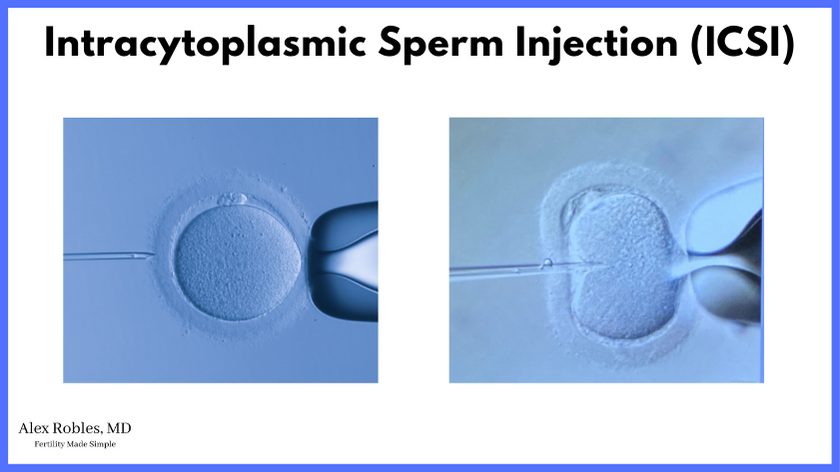In this post, you’ll learn everything you need to know about your egg retrieval day.
Specifically:
- How to prepare for the procedure,
- What to do the day before,
- What to expect on the day of the egg retrieval, and more.
Let’s get started!

Preparing For The Procedure
How do I prepare for My egg retrieval day?
There are five things you need to do to prepare for your egg retrieval.
You should:
- Free up your schedule,
- Plan to take a couple of days off from work,
- Have a chaperone who can escort you home,
- Confirm the exact time that you need to arrive by, and
- Take any prescription antibiotic if you were prescribed one.
Let’s go over them one by one.
Free Up Your Schedule
Make sure that you are flexible and can free up some time when your egg retrieval is approaching.
It is hard to predict exactly which day your retrieval will fall on, so it is important to prepare for any contingencies and plan to have prior obligations taken care of.
Plan To Take A Couple Of Days Off From Work
You must take off from work on the day of the procedure, as you will be groggy from the anesthesia. You should also consider taking the next day off as well depending on how you are feeling.
You Need A Chaperone
You will need a chaperone to escort you home as you will still feel the effects of anesthesia following the procedure. This can be your partner, a family member, or a friend.
You will not be able to drive, and you should not make any important decisions that day.
Confirm the Time Of Your Retrieval
It is absolutely critical that you arrive on time. The timing of the egg retrieval procedure is the most important step of the IVF process.
If you arrive late, you run the risk of ovulating and losing all of your eggs.
It is definitely better to be early!
Take Any Prescribed Antibiotics
Many providers will prescribe you a medication called doxycycline. This is a type of antibiotic used to reduce the risk of infection.
Usually, this medication should be started one day before retrieval and continued for approximately 3 days. (The day before, the day of, and the day after the procedure).
What day in the cycle is the egg retrieval done in IVF?
On average, the egg retrieval is done anywhere between days 12-16 of your cycle.
It happens ~36 hours after you administer your trigger shot.
So if you were told to take your trigger at 8 pm on Day 10 of your cycle, then your egg retrieval will happen at 8 am on Day 12.
The Day Before
What should I do the night before egg retrieval?
The night before your retrieval, you should not do anything that would tire you out or stress you out.
If possible, try to get an early night’s sleep so as to prepare for the day ahead.
Eat a light dinner at around 6-8 pm, and don’t eat or drink ANYTHING after midnight.
What should I eat the night before egg retrieval?
You should eat a light dinner consisting of something that you normally eat. Don’t try something new that might not agree with your stomach.
I recommend that you avoid any foods containing caffeine and you should avoid alcohol.
Can I brush my teeth before the procedure?
Yes, you can brush your teeth before the egg retrieval. Just make sure to not eat or drink anything the morning of.
If you have important medications that you need to take in the morning, you can take them with a tiny sip of water.
What do you wear during the retrieval?
You should wear comfortable clothing that you can easily remove as you will be changing into a hospital gown for the procedure.
Is it normal to have pain the day before?
It is normal to have a dull ache or a bloated feeling in your lower abdomen the day before egg retrieval.
That’s because your ovaries are enlarged 2-5x their normal size. The procedure will help decrease some of this bloating discomfort.
The Day Of The Retrieval
What can I expect on egg retrieval day?
You will arrive at the office and change into a hospital gown.
You will then meet with your doctor and/or nurse to sign some paperwork and have any further questions you may have answered.
Before starting the procedure, your identity (and your partners if applicable) will be confirmed. If a fresh semen sample is needed, your partner will be instructed on how to provide it.
The procedure itself is done under light sedation, not general anesthesia.
This means that you are not fully anesthetized, but will be sedated enough to prevent pain and anxiety.
The procedure only lasts about 10-15 minutes, but you may be in the operating room for approximately 30 minutes.

For the actual surgical procedure, a transvaginal ultrasound will be used to guide a thin needle into your ovaries to drain each follicle.
The needle provides gentle suction so that the follicular fluid will drain into a small test tube. The tube is handed off to the embryologist who searches for the eggs.
Afterward, you will then wake up in the recovery room feeling as if you have had the best sleep of your life. It is normal to have some cramping discomfort and some light vaginal spotting.
Before you leave, you will be informed of the number of eggs collected and you’ll be given instructions on what you should or shouldn’t do over the next few days.
Plan to take the rest of the day easy.
The Next Step
The following day, we will inform you how many of your eggs were mature, and how many of your eggs fertilized into embryos.
Fertilization occurs either through
- Intracytoplasmic sperm injection (ICSI): where a single sperm is injected directly into the egg, or
- Standard Insemination or “Conventional IVF”: where each egg is placed together with a petri dish with numerous sperm (which is what happens during normal fertilization in your body)
If you are freezing eggs, we can only freeze the mature eggs. You will be informed of the number frozen the day after.
Embryos are then kept incubated in the IVF lab for up to 1 week.
If you are not having a fresh embryo transfer, all viable embryos that make it to the blastocyst stage will either be frozen or biopsied for genetic testing and then frozen.

Recovering From The Procedure
Can you go to work the day after egg retrieval?
It is possible to go back to work the next day, but it depends on how you are recovering and what you do for work.
It is always a good idea to take it easy and see how your body feels. If your work is physically demanding, you may want to rest at home for the next couple of days.
Your doctor will have specific instructions on what you should do during your recovery period.
How long does it take to recover from egg retrieval?
It takes on average 2-7 days to fully recover from an egg retrieval. The more eggs you have retrieved, the longer it will take.
Most women can resume normal activities after a couple of days. Depending on how extensive your procedure was, it might take up to a week for you to be back to normal.
You can also take over-the-counter pain medication such as Tylenol and Ibuprofen at this time.
What can you not do after egg retrieval?
After an egg retrieval you should not:
- Do any heavy lifting for 1-2 weeks
- Engage in any exercise activities for 1-2 weeks
- Have sexual intercourse for at least 1 week
- Go swimming for at least 1 week (due to risk of infection)
Your ovaries are still enlarged. Any sudden movements can cause them to twist and cut off their own blood supply.
This is known as ovarian torsion. Ovarian torsion is a surgical emergency and you should seek immediate medical attention if you experience severe pain, vomiting, and feeling faint.
Other Related Questions
Is the procedure the same if I’m just freezing eggs?
The egg retrieval is exactly the same whether you are egg freezing or making embryos.
How long does it take for ovaries to shrink after egg retrieval?
It takes on average ~2 weeks for your ovaries to shrink back to their normal size after ovarian stimulation.
During this time, do not lift anything heavy, exercise vigorously, or have sexual intercourse.
For the first few days after egg retrieval, you may experience mild cramps and bloating. These are signs that the ovaries are still enlarged and inflamed.
Can The egg retrieval damage ovaries?
An egg retrieval is unlikely to damage your ovaries.
The ovaries are robust. Despite getting poked with a needle your ovaries are remarkable at healing and becoming intact again.
Does your period come early after egg retrieval?
After an egg retrieval, it is normal to start your period in approximately 10-14 days.
If you used Leuprolide acetate as your trigger injection, your period may come a bit early.
This period could be a bit heavier
Are you more fertile after An egg retrieval?
There is no evidence that fertility is increased after an egg retrieval or IVF treatment.
What kind of risks are involved with egg retrieval?
There are always risks and/or complications associated with any medical procedure.
All procedures involve a risk of infection, bleeding, and damage to surrounding organs.
Thankfully, these complications are not common and are often treated fairly conservatively.
Infection:
Any time you introduce a foreign object into your body, there is a chance of acquiring an infection.
This is why we give you prophylactic antibiotics before the procedure and recommend that you don’t go swimming following the procedure.
This is also why we recommend that you don’t go swimming, as water can get into the small punctures that the needle makes in your vaginal wall.
Bleeding:
Unfortunately, it’s not always possible to prevent all kinds of bleeding. The needle we use is small and the body is really good at clotting off active bleeding vessels.
Damage to nearby organs:
This is the main reason why we do it under ultrasound guidance. We are very careful of where the tip of our needle goes at all times.
Other risks include ovarian torsion, which is a surgical emergency, and ovarian hyperstimulation syndrome or OHSS.
Ovarian torsion:
The best way to minimize this risk is by adhering to our recommendations of avoiding exercise, vigorous activity, and intercourse for at least 1-2 weeks.
OHSS:
This is a condition that occurs in patients with a very high response to the stimulation. If you are at risk of this condition (aka you have a high follicle count), your doctor has a few ways of minimizing the severity of the symptoms.
If you are at high risk of OHSS, your doctor may recommend that you freeze all of your embryos.
Conclusion
The egg retrieval ends the IVF cycle. At this point, it is a waiting game to see how many good-quality embryos you make.
The next step is to prepare for a fresh transfer, or a frozen embryo transfer depending on your treatment plan!
Related Articles
- Immature Eggs: What Are They & What Can You Do About Them?
- How Many Blastocysts Can You Expect To Get From An IVF Cycle
- PGS Test Results: What Do They Mean?
Make An Appointment With Dr. Robles To Discuss Your Fertility Options Today!

Alex Robles, MD
Dr. Alex Robles is a Spanish-speaking Latino-American Reproductive Endocrinologist and Infertility specialist in New York City, and a board-certified OBGYN. He has a special interest in health, lifestyle, & nutrition. Make an appointment with Dr. Robles to discuss your fertility options today!
References:
El-Shawarby S, Margara R, Trew G, Lavery S. A review of complications following transvaginal oocyte retrieval for in-vitro fertilization. Hum Fertil (Camb). 2004 Jun;7(2):127-33. doi: 10.1080/14647270410001699081. PMID: 15223762.
